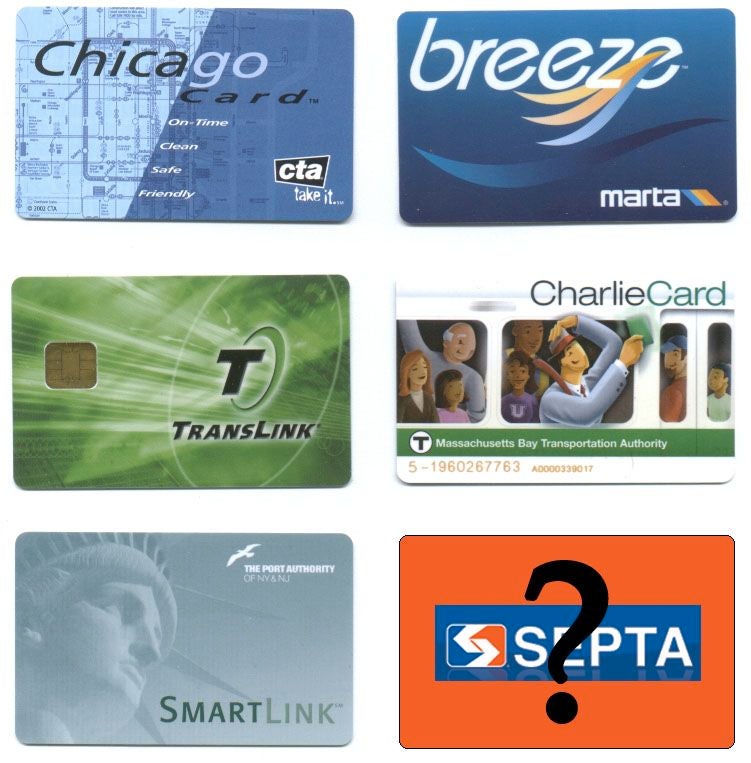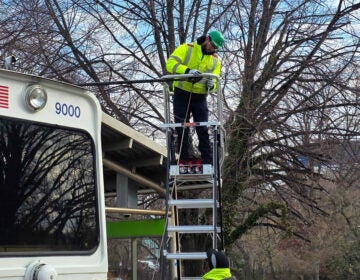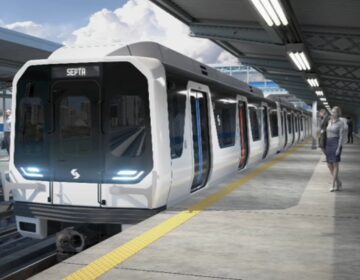Attention rail riders: Paoli/Thorndale line down
Update:
Inbound and outbound train service has been restored on the Paoli/Thorndale Regional Rail Line. Passengers traveling inbound to Center City may experience delays of up to 15 minutes.
A little something from SEPTA to add to your commuter headache:
All service, both inbound and outbound, is now suspended on the Paoli/Thorndale Regional Rail Line, due to wire damage resulting from a downed tree that disrupted outbound service earlier.
SEPTA is adding service on the Norristown High Speed Line and extra bus service on Lancaster Ave between Villanova and Paoli to accommodate inbound and outbound Paoli/Thorndale customers.
The High-Speed Line connects with the Market-Frankford Line at 69th Street for service to/from Center City and other stops in Philadelphia.
We’ll let you know when it’s back up.
WHYY is your source for fact-based, in-depth journalism and information. As a nonprofit organization, we rely on financial support from readers like you. Please give today.
SEPTA taking another run at Smart Card

Faced with a big hole in its capital budget, SEPTA is turning to the federal government for help getting the long-overdue smart card system off the ground.
The authority submitted a pre-application notice to the U.S. Department of Transportation, asking for $29.3 million in federal stimulus funds to help build the new fare collection system.
The money would come from a second round of Transportation Investment Generating Economic Recovery, or TIGER, grant money. In the first round, the Philadelphia region won $23 million to build out its network of pedestrian and bike trails (http://planphilly.com/great-panj-awarded-23-million-federal-stimulus-money).
SEPTA applied for TIGER I money for the smart card system but was not included in that allocation.
The new proposal is scaled-back, however, and would introduce the smart card only on bus and trolley routes, as well as the Norristown High Speed Line. The $77.3 million project wouldn’t cover implementation on the Market-Frankford El, Broad Street Line or the regional rail system.
(SEPTA estimates that including those additional modes would bring the total cost of building the smart card up to about $100 million.)
SEPTA spokesman Andrew Busch said that, if successful, the project would “get the [technical] backbone of the system in place” and cover a large portion of the authority’s ridership.
The smart card system could then be extended to other modes when SEPTA secures funding for them. The authority had been hoping to be first large American public transit system to extend a smart card system out to its regional rail network and has been considering installing fare gates (http://planphilly.com/septa-still-thinking-about-smarter-way-charge) at the three Center City stations.
SEPTA had canceled implementation of the smart card system when the state failed in its attempt to toll Interstate 80, leaving a $120 million shortfall in its capital budget for the current fiscal year. This bid represents a possible way around that.
The federal dollars would cover 38 percent of the reduced project’s projected cost, and SEPTA has committed to chipping in about $5.9 million from its capital budget in required matching funds. SEPTA is exploring the use of creative financing to cover the rest of the cost. It will flesh out those plans in greater detail in its bid submission, due Aug. 23.
The authority has been talking about utilizing vendor financing as a way of keeping down costs even before it lost part of its state subsidy.
The TIGER II process is expected to be even more competitive than the first round, when more than 1,400 applications, seeking almost $60 billion, chased after $1.5 billion in grant money. This time around, the program will only be awarding $700 million. The average award size for TIGER I was $30 million, just over the amount SEPTA will be asking for this time.
The city is also throwing its weight behind SEPTA’s application. It won’t be submitting its own TIGER II proposal and, though it supports efforts by others in the region — such as transportation improvements at the Art Museum — the administration considers the smart card proposal most important, according to Andrew Stober, director of strategic initiatives at the Mayor’s Office of Transportation and Utilities.
He said that even winning one TIGER slot will be a long shot, and the smart card bid is “an exciting and important proposal.”
Contact the reporter at acampisi@planphilly.com
WHYY is your source for fact-based, in-depth journalism and information. As a nonprofit organization, we rely on financial support from readers like you. Please give today.





